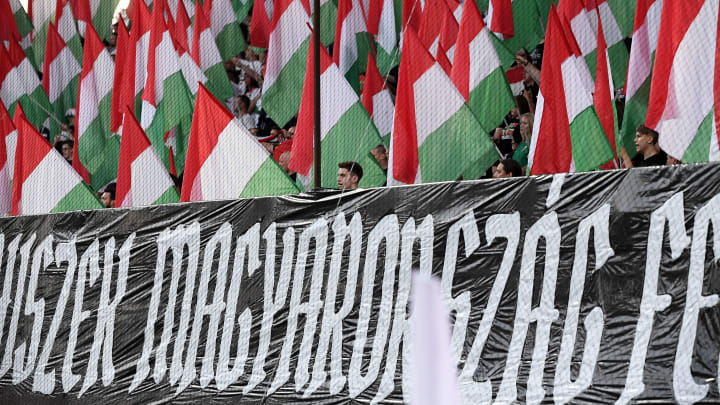
UEFA have ordered Hungary to play three games behind closed doors after fans were found guilty of racist and homophobic abuse at Euro 2020.
A discriminatory banner was seen in the stands during Hungary’s tournament opener against Portugal, after which monkey chants were heard in the Budapest crowd during the draw against France.
During the final group stage game against Germany in Munich, there were also allegations of homophobic abuse.
After investigating the incidents, UEFA have confirmed on their official website that Hungary will be punished with a stadium ban of three games, one of which is suspended for the next two years.
It means Hungary will have to play their next two competitive home internationals behind closed doors, and if they are found guilty of any more fan unrest in the next two years, they will immediately be hit with a third ban.
The Hungarian FA have also been fined €100,000 and have been ordered to display a banner reading ‘#EqualGame’ in those games without fans.
Homophobia became a prominent issue during the group stage, with the ethics of football’s governing body brought into question after an investigation was opened into Manuel Neuer’s decision to wear a rainbow-patterned captain’s armband in support of Pride Month. No punishment was ever handed out.
After that issue, Germany requested to light up the Allianz Arena with the colours of the rainbow for their meeting with Hungary, but their suggestion was rejected by UEFA, who deemed that it was too political in nature.
To mark “Christopher Street Day”, #FCBayern are once again lighting the Allianz Arena in rainbow colours this summer. ?️?
More information: https://t.co/KGEPUMbQl5
— FC Bayern English (@FCBayernEN) July 6, 2021
UEFA decreed that Germany’s proposal was meant as a direct protest towards Hungary, where a law had recently been passed banning the display of homosexuality to anyone under 18, and because UEFA felt it was purely based on politics, they chose to deny the request.
Instead, UEFA proposed alternative dates to light up the stadium, all of which came when the Allianz Arena was empty, and Germany took whatever chance they could get to show their support.
For more from Tom Gott, follow him on Twitter!


